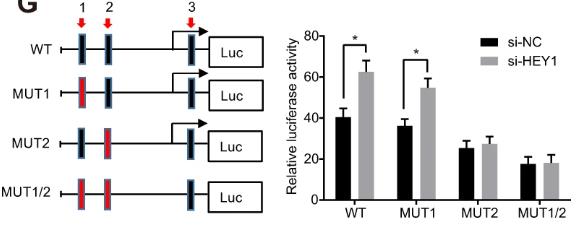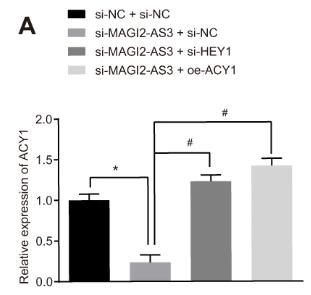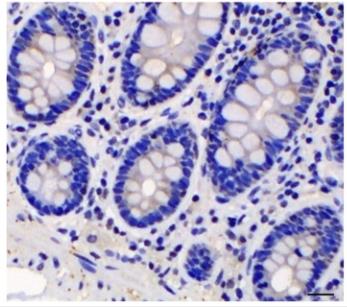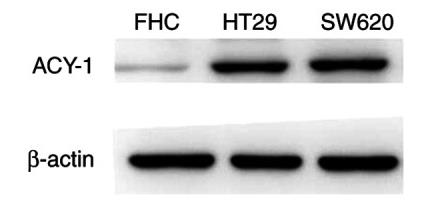Recombinant Human ACY1 protein(Met1-Ser408), His-tagged
| Cat.No. : | ACY1-242H |
| Product Overview : | Recombinant Human ACY1 (NP_000657.1) (Met 1-Ser 408) was expressed in Insect Cells with a polyhistidine tag at the C-terminus. |
| Availability | April 03, 2025 |
| Unit | |
| Price | |
| Qty |
- Specification
- Gene Information
- Related Products
- Case Study
- Application
- Download
| Species : | Human |
| Source : | Insect Cells |
| Tag : | His |
| Protein Length : | 1-408 a.a. |
| Form : | Lyophilized from sterile 50mM Tris, 100mM NaCl, pH 8.0, 10% glycerol. Normally 5 % - 8 % trehalose, mannitol and 0.01% Tween80 are added as protectants before lyophilization. |
| Molecular Mass : | The recombinant human ACY1 consists of 419 amino acids and predicts a molecular mass of 47.3 kDa. It migrates as an approximately 44 kDa protein in SDS-PAGE under reducing conditions. |
| Endotoxin : | < 1.0 EU per μg of the protein as determined by the LAL method |
| Purity : | > 95 % as determined by SDS-PAGE |
| Storage : | Samples are stable for up to twelve months from date of receipt at -20°C to -80°C. Store it under sterile conditions at -20°C to -80°C. It is recommended that the protein be aliquoted for optimal storage. Avoid repeated freeze-thaw cycles. |
| Reconstitution : | It is recommended that sterile water be added to the vial to prepare a stock solution of 0.2 ug/ul. Centrifuge the vial at 4°C before opening to recover the entire contents. |
| Full Length : | Full L. |
| Gene Name | ACY1 aminoacylase 1 [ Homo sapiens ] |
| Official Symbol | ACY1 |
| Synonyms | ACY1; aminoacylase 1; aminoacylase-1; acylase; N-acyl-L-amino-acid amidohydrolase; ACY-1; ACY1D; |
| Gene ID | 95 |
| mRNA Refseq | NM_000666 |
| Protein Refseq | NP_000657 |
| MIM | 104620 |
| UniProt ID | Q03154 |
| ◆ Recombinant Proteins | ||
| ACY1-836HF | Recombinant Full Length Human ACY1 Protein, GST-tagged | +Inquiry |
| ACY1-327H | Recombinant Human ACY1 Protein, DDK-tagged | +Inquiry |
| ACY1-4843H | Recombinant Human ACY1 Protein, Myc/DDK-tagged, C13 and N15-labeled | +Inquiry |
| Acy1-299M | Recombinant Mouse Acy1 Protein, His (Fc)-Avi-tagged | +Inquiry |
| ACY1-27H | Recombinant Human Aminoacylase 1, T7-tagged | +Inquiry |
| ◆ Cell & Tissue Lysates | ||
| ACY1-3095MCL | Recombinant Mouse ACY1 cell lysate | +Inquiry |
| ACY1-725HCL | Recombinant Human ACY1 cell lysate | +Inquiry |
Case 1: Wang G, et al. Cancer Gene Ther. 2022
Clear cell renal cell carcinoma (ccRCC) is the most common kidney cancer in adults, known for its rich blood vessels and tendency to spread. Surgery is the main treatment option since ccRCC doesn't respond well to standard therapies like chemo or radiation. Yet, the complex blood vessel structure of ccRCC makes it tough to find new treatments. This study looks at how MAGI2-AS3, a certain molecule, can help fight against blood vessel growth in ccRCC. Researchers collected samples from 86 ccRCC patients to explore this, using various assays to see how MAGI2-AS3 interacts with the transcription factor HEY1 and the ACY1 gene. They also tested the effects on ccRCC cell behavior and blood vessel formation, showing that boosting MAGI2-AS3 reduced cancer cell growth and blood vessel formation while increasing ACY1 activity. Further tests confirmed these findings, highlighting the potential of targeting MAGI2-AS3 in ccRCC treatment.

Fig1. The luciferase activity of pRL-TK-ACY1 promoter respectively mutated at three HEY1 binding sites was determined.

Fig2. The expression of ACY1 was determined in RLC-310 cells by qRT-PCR.
Case 2: Xu Z, et al. Exp Ther Med. 2021
Rectal cancer is showing up more often and at younger ages. Understanding how it develops can help catch it early and improve outcomes. Aminoacylase-1 (ACY-1) levels are off in many cancers, and it's linked to changes in proteins like HER2, which helps tumors spread, and TRAIL, which promotes tumor cell death. This study looked into how ACY-1 affects these proteins in rectal cancer. Tissues from patients were examined, and cell lines HT29 and SW620 were used to test this in a lab setting. By reducing ACY-1 in these cells, tumor growth slowed, cell death increased, HER2 decreased, and TRAIL increased. Essentially, more ACY-1 is found in rectal cancer tissues, which influences tumor behavior.

Fig1. ACY-1 expression in adjacent tissue.

Fig2. ACY-1 protein expression in HT29, SW620 cells and FHC cells.
Human ACY1, or aminoacylase 1, is an enzyme found in the cytosol that breaks down N-acetylated amino acids into acetate and free amino acids. It's key for processing acylated amino acids and shows up in various tissues, notably the kidney, liver, and brain. ACY1 has been linked to the growth control of some cancers, including colonic, liver, and kidney cancers. It's also connected to heart issues like myocardial fibrosis and heart failure by possibly affecting collagen buildup and certain signaling pathways. Mutations in the ACY1 gene can lead to metabolic disorders featuring central nervous system problems and excess urinary N-acetylated amino acids. The expression and role of this protein are being studied in cancers like neuroblastoma, with a focus on how it might influence cell behaviors through specific signaling pathways.
Recombinant human ACY1 protein sees widespread use in research and industry. For scientists, it's a tool to delve into amino acid metabolism and its impact on cell regulation, particularly regarding kidney and liver functions. It's also crucial for investigating genetic disease-related metabolic pathways. On the industrial side, ACY1 helps in developing new ways to identify and treat amino acid metabolism disorders, aiding in better diagnosis and treatment of such conditions. Moreover, its use pushes forward biotech innovations, serving as a vital resource in crafting new medications.
Not For Human Consumption!
Inquiry
- Reviews
- Q&As
Ask a Question for All ACY1 Products
Required fields are marked with *
My Review for All ACY1 Products
Required fields are marked with *
Inquiry Basket


